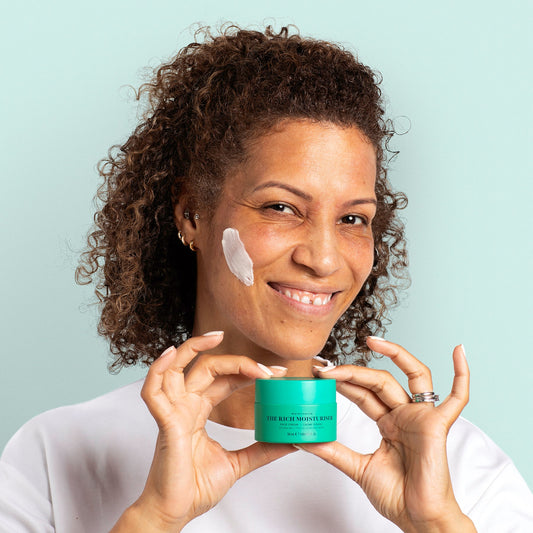Iceland. Barley. EGF. Serum. Cold.
What is it?
'BioEffect EGF Serum is a ground-breaking anti-ageing serum that delivers visible, dramatic improvements to your skin.'
Serum - although the range is much bigger.
Who is it for?
Everyone. But see my further comments below.
What’s in it?
Glycerine, Aqua, Sodium hyaluronate, Tromethamine, Sodium chloride, Hordeum vulgare seed extract, EGF (Transgenic barley sh-oligopeptide-1)
What's not in it?
Human EGF (recombinant)
Possibly acne/allergy/troubling for some ingredients?
Not really. Just the EGF, but that is kind of the point.
Natural? Organic? Man made? Vegan?
Man-made natural. If you see what I mean...
Tested on animals/sold in territories that advocate testing?
No/No
How does it smell?
Fragrance-free
How does it feel on the skin?/Absorption rate?
Absorbs immediately. If it's sticky, you're using too much.
How do you use it?/Where to use in your routine?
Serum - so am and pm under moisturiser.
How long before you should see results?
Pretty quickly. A few days will bring plumpness, the other results obviously a little longer.
How long did I test it for?
I've been using BioEffect on and off for a few years.
How much is it? /Size
£125.00 for 15ml - *currently on sale
What’s good/not so good about it?
I'm amalgamating the usual two separate sections for ease. And please bear with, because it may take a while.
- I first wrote about BioEffect over three years ago. In that post, which you can find here, I talked about how EGF was not safe, and how I would never recommend it for people with psoriasis or anything near 'dodgy' or pre-cancerous moles. I approached BioEffect and Revive for comments, BioEffect responded and clarified that their EGF was not human-based (recombinant), Revive did not respond. I updated the blog post accordingly as promised.
- Then the EU got involved. And they were not happy. Human-derived EGF is banned in the EU and a couple of years ago, Revive had to completely reformulate and thus relabel their products for the European market. To my knowledge they still use the original EGF in some products in the USA, where human-cloned EGF is not illegal. (The offer of a response comment is still open to Revive over 3 years later, if any of this is incorrect.) Be aware that if you are buying the same-named product on either side of the Atlantic, they may be completely different inside. Not illegal, but not best practice if we're being fair to the consumer.
*Revive Moisturizing Renewal Cream USA inci here ('sh-oligopeptide 1' is what you are looking for)
*Revive Moisturizing Renewal Cream UK inci here (sh-oligopeptide 1 is absent) - BioEffect were briefly embroiled in the subsequent drama, and then allowed to continue selling their version of EGF, after proving that their EGF is derived from barley, not humans.
- So what's the problem? In a nutshell, EGF stimulates skin cell proliferation, thus giving your droppy skin some perk. It's like a morning double espresso for your face. It works. Really well. Jane from British Beauty Blogger says it's one of the best products she's used on her face.
- The problem is that skin cells and EGF are not that intelligent. They cannot differentiate between normal, healthy cells and pre-cancerous/cancerous cells. They just multiply. Therein lies the problem.
- Cancer patients can be given anti-EGF medicine to slow down their tumour growth.
I put this question to the team at BioEffect on more than one occasion and recently had this reply:
'It is well recognized in oncology that the biology of cancer is very complex. Therefore, due to fact that an increase in both activity and appearance of the RECEPTOR for EGF, the EGFR/ErbB1, is often observed in certain types of cancer, it may be considered a strategic move to use anti-EGFR drugs as a treatment for all kinds of cancers. However, this increase in the activity of the RECEPTOR is often due to mutations in the receptor, resulting in various abnormalities in its structure and function. These mutations can lead to constitutive activation of the receptor, independent of the levels or the binding of EGF (Lurje G. et al. 2009). This means that the cancer cell has stopped responding to highly well controlled regulation of EGF. In addition, according to numerous studies, EGF will not turn normal cells into cancer cells, meaning that it is highly unlikely that an excess level of EGF would lead to a malignant transformation. It has even been shown that EGF may sometimes have a negative effect on growth of cancer cells and often cancer cells do not respond to EGF control at all (Acosta-Berlanga J. et al. 2009; Wong R 2003. Cell Mol Life Sci 60: 113-118).
On individual basis, it is not really possible to predict what effect it has to apply EGF to abnormal skin cell or if it will have any impact on the overall progression of these cells that have already lost some of their self-regulatory control. This is true with basically all other cosmetic ingredients intended to have an effect on the skin, such as vitamins (i.e. retinol), hyaluronic acid and various other ingredients known to promote cell renewal. Abnormal skin cells are genetically and metabolically very diverse and it is very difficult to generalize about their behavior.
Maybe most importantly, clinical studies have been made of topical ointment drugs containing EGF for wound healing of burn victims and diabetics, including a 15 year study in Cuba. These studies indicate that long term exposure of EGF in high concentration is safe and together with substantial amount of preclinical studies in animals confirm that EGF does not initiate cancer formation (Acosta-Berlanga J. et al. 2009 and 2011).
All these facts on EGF and our argumentations herein, together with our continuously accumulating acknowledgement of EGFs safety from specialists in the field, including medical doctors, dermatologists, toxicologists and safety advisors, strongly argues for the safety of using relatively low level of EGF in a skin care products aimed for topical application of normal healthy skin.’
No-one can say with any certainty. That's the truth. The pro-camp say that barley EGF is not recognised by cancerous cells due to the anomaly of being non-human and therefore have no effect. To which my question is: well if they don't affect cancerous cells why do they affect healthy cells?
The anti-camp say 'EGF is EGF' regardless and should be avoided if you have any moles or areas on the skin that you think may be a risk.
My two cents?
I like BioEffect products when my skin needs a quick boost. There is no doubt they work. They work really well. I am happy to keep using with that mind-frame as I have no moles or any areas of the skin that give me cause for concern. EGF is mitogenic, not mutogenic. They stimulate cells, they absolutely do not cause cancer to form where it is not present.
If you need a quick boost, crack on. If you have a history of melanoma use your good sense.
One thing everyone agrees on is that human-derived EGF is NOT good. Except the USA, but they have one of the most under-regulated skincare/cosmetic industries in the world. Avoid it. The ingredient, not the USA. :)
Further reading:
barefacedtruth.com
Beautypedia.com
anti-egf studies
Works well with?
Anything. it's all good.
What’s the website like?
Good. Tells the story. Easy to maneuver.
Would I purchase/repurchase?
Yes absolutely as a booster. Personally, not for long-term use.
Similar products?
Nothing. BioEffect are alone with this. That's a compliment.
BioEffect is currently £95 instead of £125.00 and available from bioeffect.co.uk
As always: either brand mentioned is more than welcome to make further comment.



























